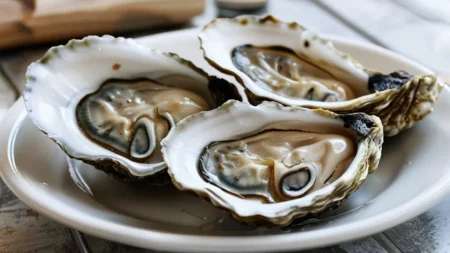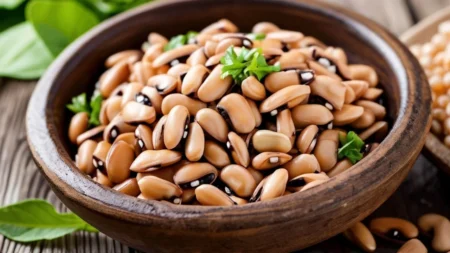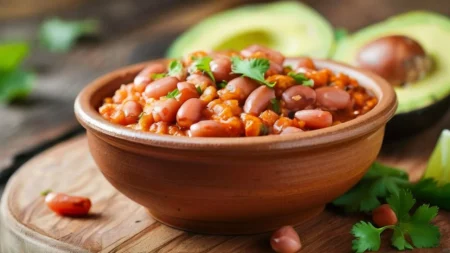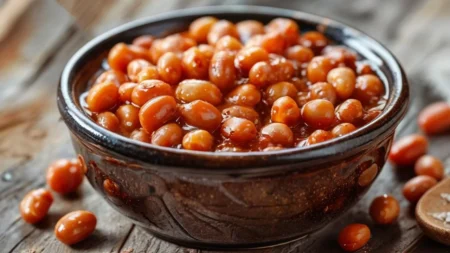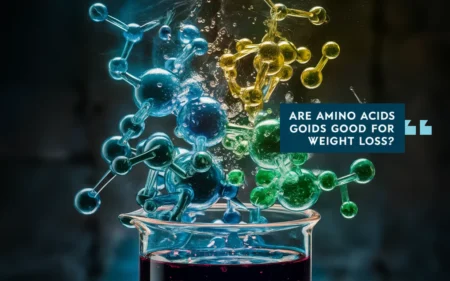Pickles are a common food in American diets. But, as health and weight loss become more important, people wonder if pickles can help. We’ll look into the nutrition of pickles, their benefits for losing weight, and their possible downsides for a healthy lifestyle.
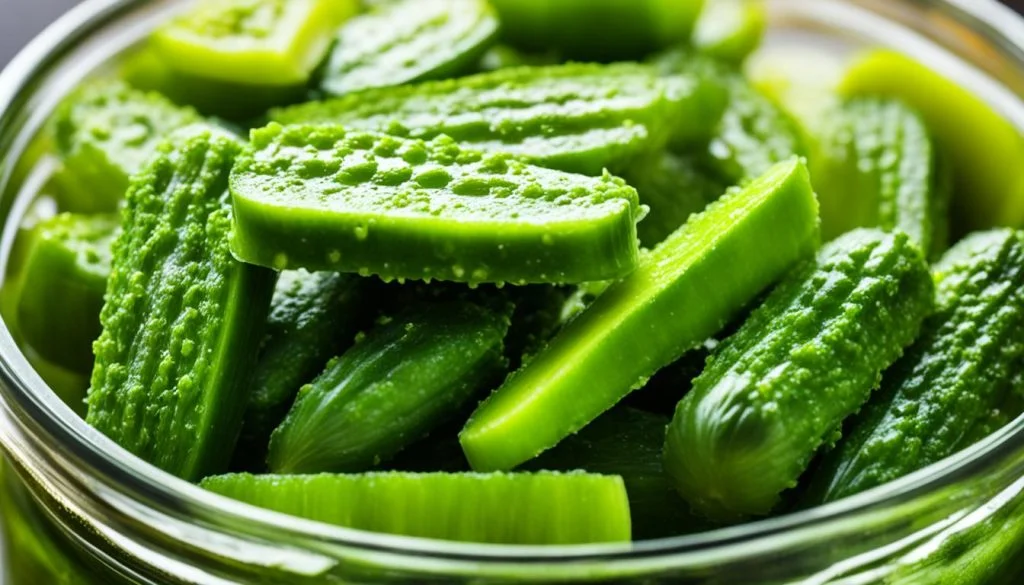
Key Takeaways
- Pickles are low in calories and can be a helpful addition to a weight loss diet.
- Pickles are a good source of vitamins, minerals, and antioxidants that may support overall health.
- The high sodium content in pickles may be a concern for some individuals, particularly those with high blood pressure.
- Pickles may help with appetite suppression, but their effectiveness for weight loss depends on the individual and their overall diet and lifestyle.
- Moderation is key when incorporating pickles into a weight loss plan, as consuming too many can lead to overconsumption of sodium.
The Nutritional Profile of Pickles
Pickles are often seen as unhealthy snacks, but they’re actually quite nutritious. They are low in calories, making them great for those trying to lose weight. A single dill pickle has only about 16 calories, with very little carbs and fat.
Calorie Count and Macronutrients
Pickles are not just low in calories. They also have few carbs, with a single dill pickle having around 2 grams. Plus, they are almost fat-free. This makes them perfect for those on a low-carb or keto diet.
Vitamins, Minerals, and Antioxidants
Despite their size, pickles are packed with nutrients. They are a good source of important vitamins and minerals, including:
- Vitamin K – This nutrient is crucial for blood clotting and keeping bones strong.
- Vitamin C – Pickles are a great way to get this vitamin, which boosts the immune system and helps make collagen.
- Iron – This mineral is key for carrying oxygen throughout the body.
Pickles also have antioxidants that support health. These include vitamin C and polyphenols, which fight off harmful free radicals and lower inflammation.
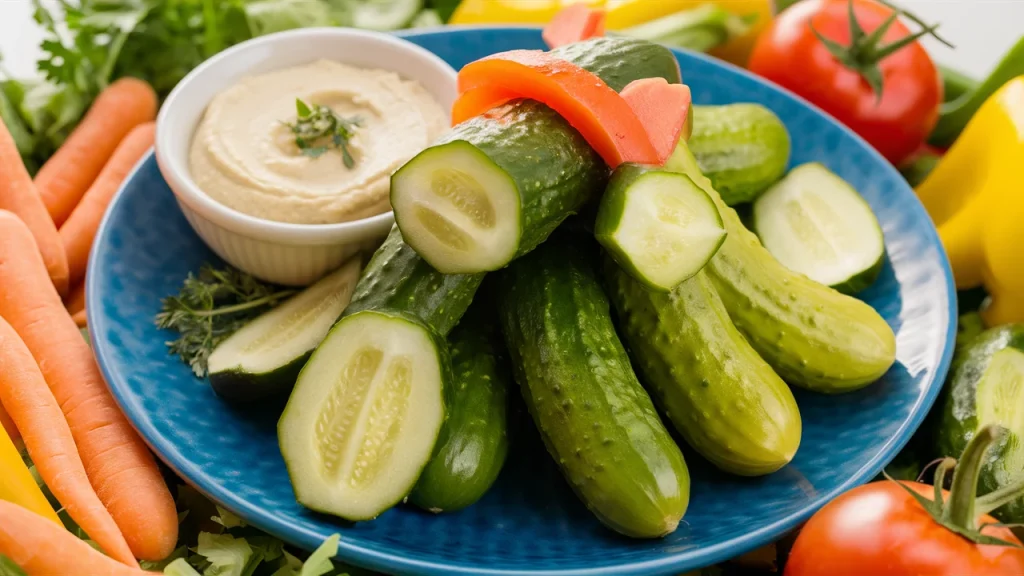
Pickles are more than just tasty; they’re also good for you. They can help with weight management and overall health. So, consider adding pickles to your diet for a healthy snack.
The Potential Benefits of Pickles for Weight Loss
Pickles can be a great addition to your weight loss plan. They are low in calories and carbs, making them a filling snack. The vinegar in pickles might also help control your hunger, which can lead to eating less.
Here are some ways pickles can help with weight loss:
- Calorie-conscious snacking: Pickles are very low in calories, with a serving having about 16 calories. They’re perfect for curbing snack cravings without ruining your diet.
- Appetite regulation: The vinegar in pickles can slow down how fast food leaves your stomach. This makes you feel full for a longer time, which can help you eat fewer calories.
- Hydration and nutrient density: Pickles are mostly water, which helps with hydration and makes you feel more satisfied. They also have vitamins and minerals like vitamin K, making them a healthy choice.
Adding pickles to your diet as a low-calorie snack can be easy and effective for weight loss. Pickles can help manage your hunger and calorie intake. They can be a key part of a balanced, healthy lifestyle.
Are Pickles Good for Weight Loss?
Pickles are often seen as a low-calorie snack that helps with weight management. But, the story is more detailed than that. Their low calorie and carb content, along with the vinegar’s appetite-suppressing effects, are key to their weight loss benefits.
Pickles and Appetite Suppression
Research shows that the acetic acid in vinegar slows down how fast food leaves the stomach. This makes you feel fuller for longer and helps you eat less. This is great for those looking to lose weight and control their appetite.
Pickles are also low in calories and carbs, making them a good snack for weight loss diets. They’re mostly water and taste great, helping you curb cravings without eating too many calories.
| Nutrient | Amount in 1 Medium Pickle (30g) |
|---|---|
| Calories | 8 calories |
| Total Carbohydrates | 2g |
| Sodium | 569mg |
| Vitamin K | 7.5mcg |
| Vitamin C | 1.1mg |
Adding pickles to a weight loss plan can be good, but remember to eat them in moderation. The high sodium in pickles might be a concern for some. Also, how pickles affect weight loss can differ based on your diet and lifestyle.
The Downsides of Consuming Pickles
Pickles can be good for your weight loss plan, but they have some downsides. One big issue is their high sodium content. A single dill pickle can have about 570 mg of sodium, which is a lot for one snack.
Sodium Content and Potential Risks
Eating too much sodium can cause water retention, high blood pressure, and other health problems. The salt in pickles might also make some people feel bloated or uncomfortable. It’s important to eat pickles in moderation to avoid these issues.
Remember, eating too many pickles can be bad for your health because of the sodium. Pickles are tasty and low in calories, but you should balance them with other foods for a healthy diet. This helps you stay on track with your weight loss goals.
FAQ
What is the calorie count and macronutrient profile of pickles?
Pickles are low in calories, with a dill pickle having about 16 calories. They are also low in carbs and fat. This makes them good for those on a low-calorie or low-carb diet.
What vitamins, minerals, and antioxidants are found in pickles?
Pickles are packed with vitamins and minerals like vitamin K, vitamin C, and iron. They also have antioxidants. These can boost overall health.
How can pickles aid in weight loss?
Pickles can help with weight loss in several ways. They are low in calories and carbs, making them a filling snack. The vinegar in them might also help you eat less by making you feel full longer.
How can the vinegar in pickles suppress appetite?
Vinegar’s acetic acid slows down how fast food leaves your stomach. This can make you feel fuller for longer. It’s great for those trying to eat fewer calories.
What are the potential downsides of consuming pickles?
Pickles can be good for weight loss, but they have some downsides. They are high in sodium, with a single dill pickle having about 570 mg. Too much sodium can cause water retention and high blood pressure. The salt can also lead to bloating or stomach discomfort. It’s important to eat pickles in moderation.






